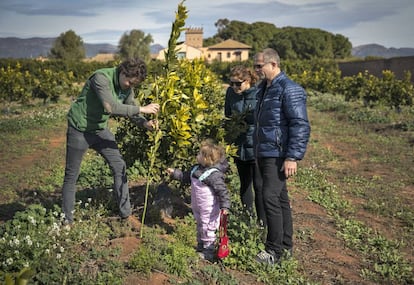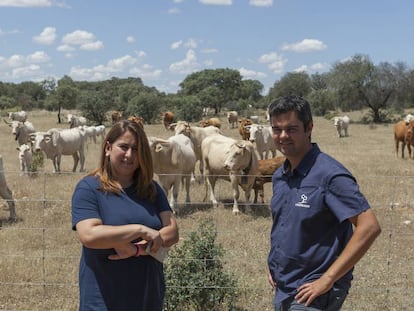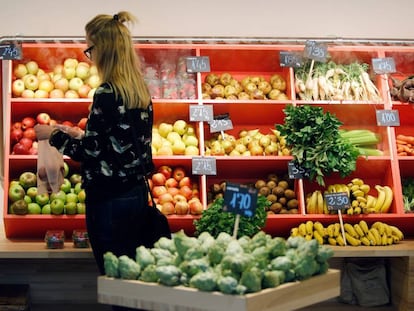Forget the orange, buy the tree: Valencia project revolutionizes traditional farming
Naranjas del Carmen gives clients chance to have lifelong relationship with the source of their fruit


The local residents of B¨¦tera, a village in Valencia with no tourist attractions to speak of, are perplexed by the sudden influx of visitors, mostly from central Europe, who arrive in town each day. They come from Austria, Switzerland, France and most particularly Germany, and they come with one goal in mind: to visit the orange grove of Naranjas del Carmen and see the tree that was planted just for them.
Naranjas del Carmen has 10,847 orange trees and each one has an owner
Naranjas del Carmen was initially founded by brothers Gonzalo and Gabriel ?rculo in 2010 as an online business dedicated to the direct sale of citrus fruits. While they still sell seasonal products, as well as honey and wine, their sales model has changed. Now, instead of selling oranges, they sell orange trees.
A tree is planted specifically for the customers, who then have the right to receive its fruits whenever they want. In exchange, the customer pays an annual upkeep fee that could be charged for as many as 25 years. While the tree is growing, the company offers the customer oranges from a fully grown tree on the property that doesn¡¯t yet have an owner.
Oranges are picked off the branch, packaged and sent the very same day that a customer places an order. Once the tree begins to produce fruit, the client receives the annual harvest from the tree. It¡¯s a model that builds loyalty as owners become increasingly attached to their tree, coming to view it like a pet. They can give it a name and follow its progress as it grows ¨C and even pay the tree a visit.
On Crowdfarming, customers can receive information and photos of the animals and trees on their virtual farm
From this model, the brothers have created a spin-off firm called Crowdfarming, a company that delivers fresh, ecological products in partnership with suppliers in several other regions and countries. They already sell olives in Castell¨®n and almonds in Granada. And in a few weeks, they will begin to sell cocoa trees in the Philippines, coffee shrubs in Colombia, and even cows in France and Italy in exchange for Comt¨¦ and Parmesan cheese.
In three years, the entrepreneurial siblings predict there will be around 1,000 products for sale: ¡°Like an Amazon farm,¡± says Gonzalo.
From €25,000 to €2.5 million in sales
In 2016, Naranjas del Carmen had 700 customers. The brothers had launched the business after inheriting an unproductive orchard from their grandfather that was set be sold. Today, however, there are 10,847 orange trees growing on the premises, each one with an owner, with 5,000 more people on a waiting list and 100 new requests arriving each day. The company sells 50,000 kilograms of oranges a week, shipping the produce in small boxes to owners throughout central Europe. Sales have soared from €25,000 to €2.5 million.
The brothers, both in their 30s, explain that Naranjas del Carmen is independent from Crowdfarming, a project that emerged in response to the number of requests they received to plant orange trees. Instead of buying more land in B¨¦tera at increasingly high prices, they decided to get other producers to adopt their model and join Crowdfarming instead. Almost any product fits within the model, but the owners admit it is more difficult to build an emotional attachment when it comes to food such as meat. It¡¯s a situation they¡¯re looking into, but for now their website will not offer this option to vegetarians.
Gonzalo describes Crowdfarming as an Amazon farm
The small-scale growers who have joined Crowdfarming are independent. The job of the ?rculo brothers is to ensure that their partners meet organic food standards, and they also deal with the logistics: sales, customer care and home delivery. On the online platform, customers can decide what food they want to include on their virtual farm-orchard, and receive information and photographs of their animals and trees.
¡°The growers of B¨¦tera keep asking us how we can be so profitable if our orange trees produce half the fruit that theirs do. This is because we are not paid per kilo but for the upkeep of the tree,¡± explains Gonzalo. And because they have sold the harvest before the beginning of the season, the owners argue they can focus on producing quality fruit. At €2.5 per kilo if the delivery is within Spain, the cost of Naranjos del Carmen is significantly higher than supermarket prices.
Tourist visits
Customers love to visit their orange trees. The business has had to set a daily limit because many people were turning up without warning by following the exact location of their tree as provided by the company website.
Gonzalo believes that the same thing will happen with the cows, which will each be ¡°adopted¡± by 160 clients. He credits this to the ¡°fan¡± phenomenon: not long ago two clients, Priska Lange, 38 and Gregor Weber, 36, traveled 2,000 kilometers in a motor home from Bremen in Germany to B¨¦tera. Although the couple had planned to see other sites in Spain, their main reason for the trip was to visit their tree. ¡°It¡¯s important for us that protection of the planet be compatible with work and for small-scale farmers to be able to survive,¡± said the woman.
The success of Naranjas del Carmen has opened the door to new opportunities in agro-tourism which the ?rculo brothers are looking to explore with their recently opened bed-and-breakfast, located inside a rural house on their premises and available only to the owners of the orange trees.
English version by Melissa Kitson.
Tu suscripci¨®n se est¨¢ usando en otro dispositivo
?Quieres a?adir otro usuario a tu suscripci¨®n?
Si contin¨²as leyendo en este dispositivo, no se podr¨¢ leer en el otro.
FlechaTu suscripci¨®n se est¨¢ usando en otro dispositivo y solo puedes acceder a EL PA?S desde un dispositivo a la vez.
Si quieres compartir tu cuenta, cambia tu suscripci¨®n a la modalidad Premium, as¨ª podr¨¢s a?adir otro usuario. Cada uno acceder¨¢ con su propia cuenta de email, lo que os permitir¨¢ personalizar vuestra experiencia en EL PA?S.
?Tienes una suscripci¨®n de empresa? Accede aqu¨ª para contratar m¨¢s cuentas.
En el caso de no saber qui¨¦n est¨¢ usando tu cuenta, te recomendamos cambiar tu contrase?a aqu¨ª.
Si decides continuar compartiendo tu cuenta, este mensaje se mostrar¨¢ en tu dispositivo y en el de la otra persona que est¨¢ usando tu cuenta de forma indefinida, afectando a tu experiencia de lectura. Puedes consultar aqu¨ª los t¨¦rminos y condiciones de la suscripci¨®n digital.










































